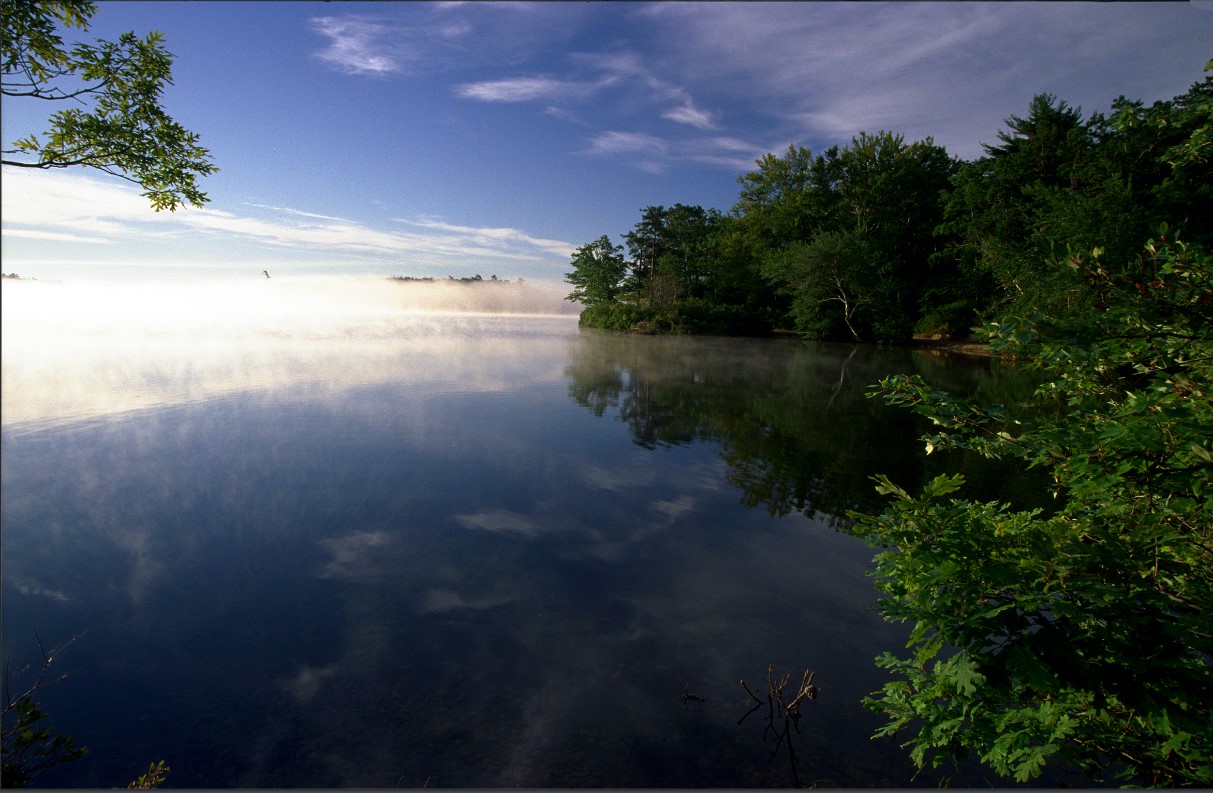By Scott MacFaden, Director of Land Protection
Often a productive time of year for land preservation projects, this November proved particularly so for Wildlands. We completed a purchase in Plymouth and a land donation in Halifax that expanded two of our largest preserves, Halfway Pond Conservation Area and Striar Conservancy.
In Scituate and Plymouth, partnership projects reached a critical juncture and a closing, respectively. In Scituate, town meeting voters approved the purchase of MacDonald Farm, a beloved local landmark on 1st Cliff, and the town of Plymouth purchased an 88-acre property that includes one of the town’s highest-elevation landforms, the striking Hio Hill.
Early morning mist at Halfway Pond.
Halfway Pond Conservation Area Addition | Plymouth
A few days before Thanksgiving, Wildlands completed the purchase of an 11.4-acre parcel on Halfway Pond in Plymouth from the Waltham-based Advaita Meditation Center. This acquisition complements recent acquisitions we have made over the past several years near Halfway Pond and further expands Halfway Pond Conservation Area, one of our oldest, largest, and most beloved preserves.
A rectangular-shaped parcel with varying topography, this property is primarily wooded upland and includes over 470 feet of frontage on Halfway Pond. It is integral to our ongoing effort to pursue ecological restoration efforts along the pond’s shore that will allow for the revegetation of native species. Wildlands now owns almost all of Halfway Pond’s western shoreline.
A generous private donor supplied all of the funding for this acquisition. Wildlands is fortunate to enjoy the support of such donors who share our belief in the importance, indeed the imperative, of preserving our region’s natural heritage.
A snowy owl at rest at MacDonald Farm.
Photo courtesy of Jim Petit.
MacDonald Farm | Scituate
On November 14, voters at Scituate’s special town meeting voted to approve the town’s purchase of MacDonald Farm, the last remaining undeveloped parcel on 1st Cliff and one of the few remaining along the town’s 21-mile coastline.
MacDonald Farm includes 600 feet of frontage on Scituate Harbor, abuts other open space parcels and NOAA’s Stellwagen Bank National Marine Sanctuary headquarters, and is a significant component of the vista from multiple vantage points in Scituate Harbor. In decades past, saltmarsh hay and Irish moss were harvested from its shores.
The town will use Community Preservation Act (CPA) funds to acquire the property and, in keeping with CPA requirements, will grant a Conservation Restriction on the property to Wildlands following the closing.
MacDonald Farm has been a long-time preservation priority for local stakeholders, including 1st Cliff resident and abutter Mary Jenkins, and NOAA. Mary co-sponsored the application we submitted to the Scituate Community Preservation Committee last summer and was integral to the process of advancing the application through the review and approval process that culminated in the town meeting vote. NOAA representatives, Ben Haskell and Anne-Marie Runfola, provided invaluable support throughout that review and approval process. Wildlands is pleased to have had the opportunity to join the project in its latter stages and collaborate with these local stakeholders, town officials, and volunteers toward advancing the preservation effort.
Hio Hill Preserve | Plymouth
On November 29, the town of Plymouth acquired 88 acres off the east side of Old Sandwich Road in southeast Plymouth. The town used $1.1 Million in CPA open space funds and a $50,000 contribution from Wildlands to purchase the property, also known as Hio Hill Preserve. We were able to provide this critical complementary funding courtesy of a generous private donor.
Hio Hill Preserve is entirely wooded upland, with notably diverse topography. Its most prominent feature is its namesake hill, one of the highest elevation landforms in all of Plymouth. Hio Hill’s broad summit plateau offers views of Cape Cod Bay as well as much of the surrounding landscape. It directly abuts other open space parcels, including town-held land, and sits just across Old Sandwich Road from a 450-acre open space assemblage comprising multiple town open space parcels and our Richard F. Wynn Preserve. It is partially within a Zone II wellhead protection area and helps protect a town drinking water well situated three-fifths of a mile to the southeast.
Wildlands will hold a CPA Conservation Restriction on this outstanding new addition to the town’s portfolio of municipally-owned conservation land.
Along the Winnetuxet River in Halifax.
Striar Conservancy Addition | Halifax
Courtesy of the Stevens family, the last of our November projects included the donation of a 3.6-acre parcel along the lower Winnetuxet River in Halifax. Comprising primarily riparian wetlands, the parcel directly abuts and expands Striar Conservancy, our largest preserve in Halifax, and sits across the Winnetuxet’s expansive floodplain from the town of Halifax’s Randall-Hilliard Preserve, upon which Wildlands holds a Conservation Restriction.
Clyde and Gladys Stevens acquired the property in 1963. With the 2015 passing of Gladys Stevens, the property descended to her heirs, Ernest Stevens and Jeanne (Stevens) Wilson Baum, who graciously donated the parcel to Wildlands. We thank Mr. Stevens and Ms. Baum for their donation of this important component of the Winnetuxet River corridor.




